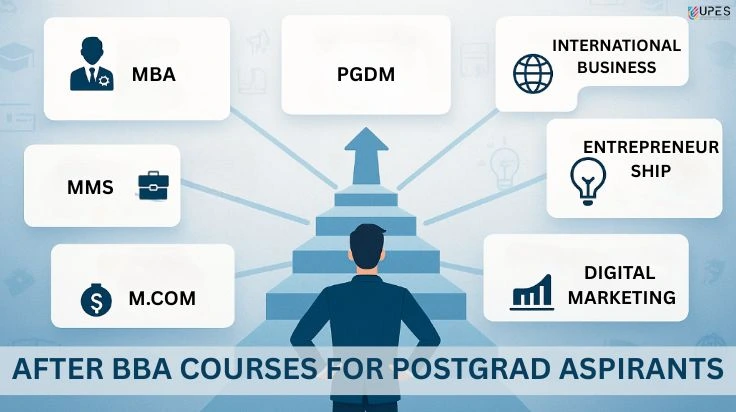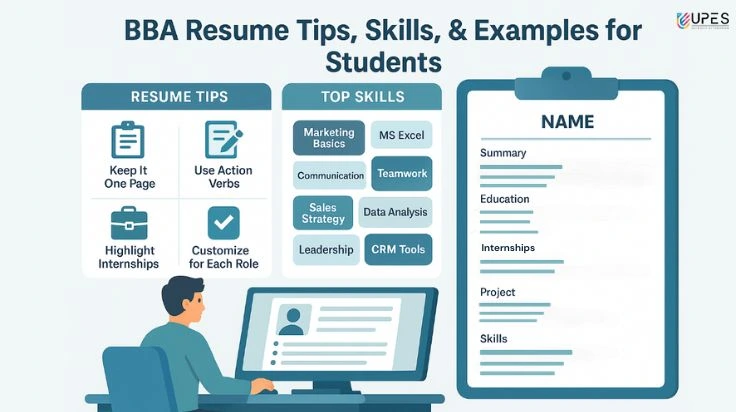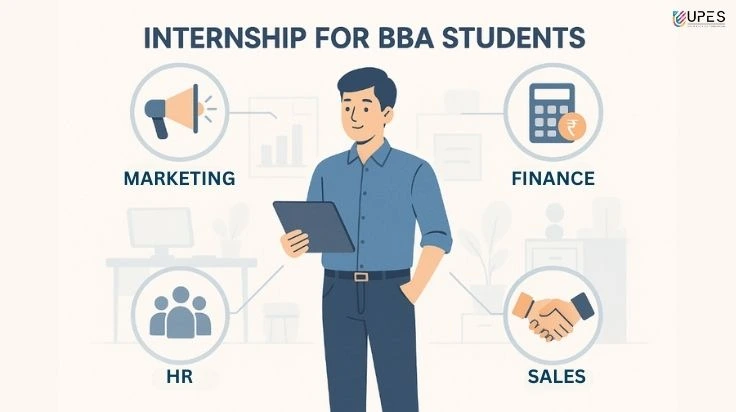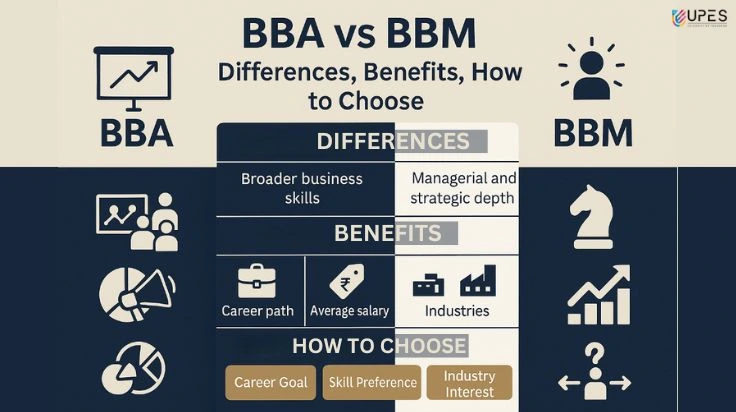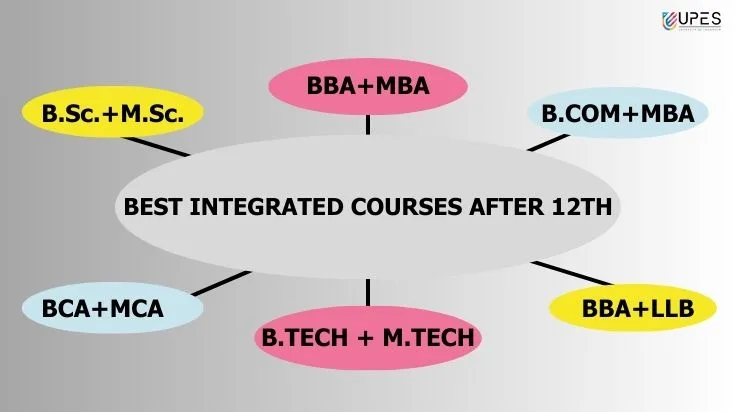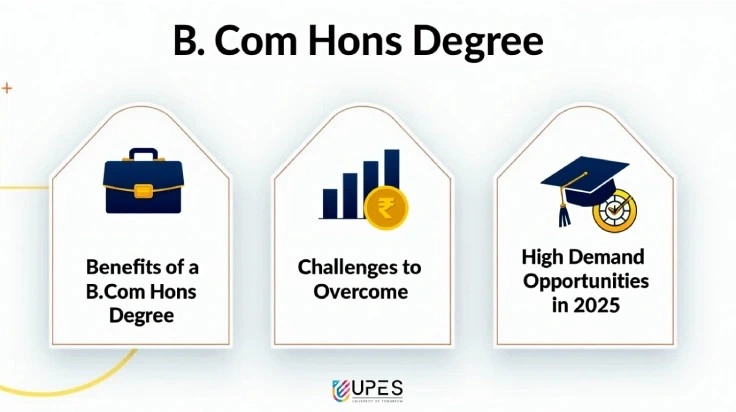Guide to Essential Networking Tips for BBA Students
- UPES Editorial Team
- Published 26/09/2024

85% of Jobs Are Filled Through Networking! It’s surprising but true networking is the key to unlocking career success. Research shows that candidates with strong networks are a staggering 58% more likely to land job offers than those who don’t actively connect.
For BBA graduates, this makes networking not just a valuable tool, but a critical component of career advancement and job hunting. The power of well-established connections can’t be overstated. But how do you build a network that works for you?
Dive into our complete guide on essential networking tips for BBA students. Read, apply, and watch your career soar!
Networking vs. Traditional Job Searching: A BBA Student’s Guide
Are you constantly Googling questions like “Which job is best for BBA students?” or “What’s the top internship for BBA students?” The ultimate answer lies in one powerful tool: Networking! As the saying goes, “Your network is your net worth.” Effective networking doesn’t just land you the perfect job or internship; it also helps you create a vibrant, supportive community around you.
For BBA students, traditional job searching typically involves applying to posted positions online or through recruitment agencies. This method often means competing with many candidates and waiting for responses. In contrast, networking provides direct access to job opportunities and can lead to personal referrals, which significantly boosts your chances of standing out.
How Networking Opens Doors to Hidden Job Markets
For BBA students, networking is particularly valuable for accessing the hidden job market, which consists of job opportunities that are not publicly advertised. Here’s how networking helps unlock these exclusive opportunities:
1. Access to Hidden Job Market/Unadvertised Positions:
Many companies prefer to fill positions through internal referrals or word-of-mouth rather than public job postings. Networking enables BBA students to hear about these unadvertised roles through connections who are already working in their target industry or company.
2. Insights and Referrals:
Building relationships with industry professionals who can provide valuable insights about upcoming job openings or internal hiring processes can be very effective. These connections can refer students directly to hiring managers, giving them a competitive edge.
3. Industry Trends and Company Culture:
Your Network will keep you up-to-date with information about industry trends, company cultures, and potential job opportunities. This insider knowledge can help students tailor their applications and approach, making them more attractive candidates.
4. Expanding Your Reach:
By connecting with alumni, attending industry events, and participating in professional groups, students can tap into a broader network of job leads and opportunities.
Networking Basics for BBA Students
Start Early:
Networking is most effective when you begin early in your academic journey. Early networking helps you discover potential career paths, gain insights into different industries, and secure internships that align with your long-term goals. By the time you graduate, you’ll have a robust network of contacts ready to support your career advancement.
Who to Network With:
| Professors and Faculty | Alumni | Industry Professionals | Peers |
Effective Networking Strategies
Utilize LinkedIn:
LinkedIn is a must-have tool for BBA students looking to build a professional network.
- Create a professional, well-updated LinkedIn profile.
- Join LinkedIn groups related to your field of interest. Actively comment and share posts.
- Connect with alumni, professors, and industry professionals.
- Stay active by publishing articles or sharing insights.
PRO Tip: Don’t be afraid to send personalized connection requests.
Attend Networking Events:
- Attend career fairs, industry conferences, workshops, and guest lectures.
- Keep business cards, a polished elevator pitch, and a list of questions to ask handy.
- After meeting someone, follow up with a personalized email or LinkedIn message.
Leverage Social Media:
Beyond LinkedIn, other social media platforms like Twitter and Instagram can also be valuable for networking.
- Follow industry leaders, companies, and relevant hashtags to stay updated on the latest trends and opportunities.
- Engage with their content by liking, commenting, and sharing, which can help you get noticed. Twitter, in particular, is a great platform for joining industry conversations and connecting with professionals who share your interests.
PRO Tip: Always keep your social media profiles professional, as potential employers and contacts may look you up online.
Join Campus Clubs and Organizations:
Campus clubs and organizations are excellent for networking and gaining leadership experience.
- Join or even take on leadership roles in business-related clubs such as marketing, finance, or entrepreneurship clubs.
- Participate in workshops, and competitions that can connect you with industry professionals and like-minded peers.
Being active in these organizations not only expands your network but also enhances your resume with practical experience and demonstrated commitment to your field.
The Art of Follow-Up
Networking doesn’t end after the initial meeting; the real value lies in maintaining those connections over time. After meeting someone, whether at a networking event, in class, or during an internship, it’s essential to follow up within 24-48 hours.
A simple, personalized email or LinkedIn message can go a long way. In your message, reference something specific from your conversation to jog their memory and express your appreciation for their time. This shows that you value the connection and are serious about maintaining it.
Here’s a List of Things You can Do to Keep the Connection Alive:
- Congratulate on professional achievements
- Check in to see how people are doing
- Invite your connections to events
- Share insightful articles
- Refer your peers to jobs, internships they fit into
Remember to Start Small
Networking can be daunting, especially for introverted BBA students. Don’t worry! Success usually follows once you make a start! Begin by attending smaller, more intimate networking events where you can have meaningful one-on-one conversations.
Focus on quality over quantity by building a few strong connections rather than trying to meet everyone in the room.
Digital platforms like LinkedIn offer introverts a comfortable space to network without the pressure of face-to-face interactions. You can connect with professionals, join discussions, and build relationships at your own pace, making online networking an excellent option for introverts.
Conclusion
Networking is your secret weapon as a BBA student. It’s not just about landing a job—it’s about creating a powerful network that will propel your career forward. Start building connections early, engage meaningfully with professionals, and maintain those relationships over time. Remember, your network is your greatest asset—invest in it, and it will pay dividends throughout your career.
85% of Jobs Are Filled Through Networking! It’s surprising but true networking is the key to unlocking career success. Research shows that candidates with strong networks are a staggering 58% more likely to land job offers than those who don’t actively connect.
For BBA graduates, this makes networking not just a valuable tool, but a critical component of career advancement and job hunting. The power of well-established connections can’t be overstated. But how do you build a network that works for you?
Dive into our complete guide on essential networking tips for BBA students. Read, apply, and watch your career soar!
Networking vs. Traditional Job Searching: A BBA Student’s Guide
Are you constantly Googling questions like “Which job is best for BBA students?” or “What’s the top internship for BBA students?” The ultimate answer lies in one powerful tool: Networking! As the saying goes, “Your network is your net worth.” Effective networking doesn’t just land you the perfect job or internship; it also helps you create a vibrant, supportive community around you.
For BBA students, traditional job searching typically involves applying to posted positions online or through recruitment agencies. This method often means competing with many candidates and waiting for responses. In contrast, networking provides direct access to job opportunities and can lead to personal referrals, which significantly boosts your chances of standing out.
How Networking Opens Doors to Hidden Job Markets
For BBA students, networking is particularly valuable for accessing the hidden job market, which consists of job opportunities that are not publicly advertised. Here’s how networking helps unlock these exclusive opportunities:
1. Access to Hidden Job Market/Unadvertised Positions:
Many companies prefer to fill positions through internal referrals or word-of-mouth rather than public job postings. Networking enables BBA students to hear about these unadvertised roles through connections who are already working in their target industry or company.
2. Insights and Referrals:
Building relationships with industry professionals who can provide valuable insights about upcoming job openings or internal hiring processes can be very effective. These connections can refer students directly to hiring managers, giving them a competitive edge.
3. Industry Trends and Company Culture:
Your Network will keep you up-to-date with information about industry trends, company cultures, and potential job opportunities. This insider knowledge can help students tailor their applications and approach, making them more attractive candidates.
4. Expanding Your Reach:
By connecting with alumni, attending industry events, and participating in professional groups, students can tap into a broader network of job leads and opportunities.
Networking Basics for BBA Students
Start Early:
Networking is most effective when you begin early in your academic journey. Early networking helps you discover potential career paths, gain insights into different industries, and secure internships that align with your long-term goals. By the time you graduate, you’ll have a robust network of contacts ready to support your career advancement.
Who to Network With:
| Professors and Faculty | Alumni | Industry Professionals | Peers |
Effective Networking Strategies
Utilize LinkedIn:
LinkedIn is a must-have tool for BBA students looking to build a professional network.
- Create a professional, well-updated LinkedIn profile.
- Join LinkedIn groups related to your field of interest. Actively comment and share posts.
- Connect with alumni, professors, and industry professionals.
- Stay active by publishing articles or sharing insights.
PRO Tip: Don’t be afraid to send personalized connection requests.
Attend Networking Events:
- Attend career fairs, industry conferences, workshops, and guest lectures.
- Keep business cards, a polished elevator pitch, and a list of questions to ask handy.
- After meeting someone, follow up with a personalized email or LinkedIn message.
Leverage Social Media:
Beyond LinkedIn, other social media platforms like Twitter and Instagram can also be valuable for networking.
- Follow industry leaders, companies, and relevant hashtags to stay updated on the latest trends and opportunities.
- Engage with their content by liking, commenting, and sharing, which can help you get noticed. Twitter, in particular, is a great platform for joining industry conversations and connecting with professionals who share your interests.
PRO Tip: Always keep your social media profiles professional, as potential employers and contacts may look you up online.
Join Campus Clubs and Organizations:
Campus clubs and organizations are excellent for networking and gaining leadership experience.
- Join or even take on leadership roles in business-related clubs such as marketing, finance, or entrepreneurship clubs.
- Participate in workshops, and competitions that can connect you with industry professionals and like-minded peers.
Being active in these organizations not only expands your network but also enhances your resume with practical experience and demonstrated commitment to your field.
The Art of Follow-Up
Networking doesn’t end after the initial meeting; the real value lies in maintaining those connections over time. After meeting someone, whether at a networking event, in class, or during an internship, it’s essential to follow up within 24-48 hours.
A simple, personalized email or LinkedIn message can go a long way. In your message, reference something specific from your conversation to jog their memory and express your appreciation for their time. This shows that you value the connection and are serious about maintaining it.
Here’s a List of Things You can Do to Keep the Connection Alive:
- Congratulate on professional achievements
- Check in to see how people are doing
- Invite your connections to events
- Share insightful articles
- Refer your peers to jobs, internships they fit into
Remember to Start Small
Networking can be daunting, especially for introverted BBA students. Don’t worry! Success usually follows once you make a start! Begin by attending smaller, more intimate networking events where you can have meaningful one-on-one conversations.
Focus on quality over quantity by building a few strong connections rather than trying to meet everyone in the room.
Digital platforms like LinkedIn offer introverts a comfortable space to network without the pressure of face-to-face interactions. You can connect with professionals, join discussions, and build relationships at your own pace, making online networking an excellent option for introverts.
Conclusion
Networking is your secret weapon as a BBA student. It’s not just about landing a job—it’s about creating a powerful network that will propel your career forward. Start building connections early, engage meaningfully with professionals, and maintain those relationships over time. Remember, your network is your greatest asset—invest in it, and it will pay dividends throughout your career.
UPES Editorial Team
Written by the UPES Editorial Team
UPES Admission Enquiry
Subscribe to UPES Blogs
Join our community for exclusive stories, insights, and updates
By clicking the "Subscribe" button, I agree and accept the privacy policy of UPES.









